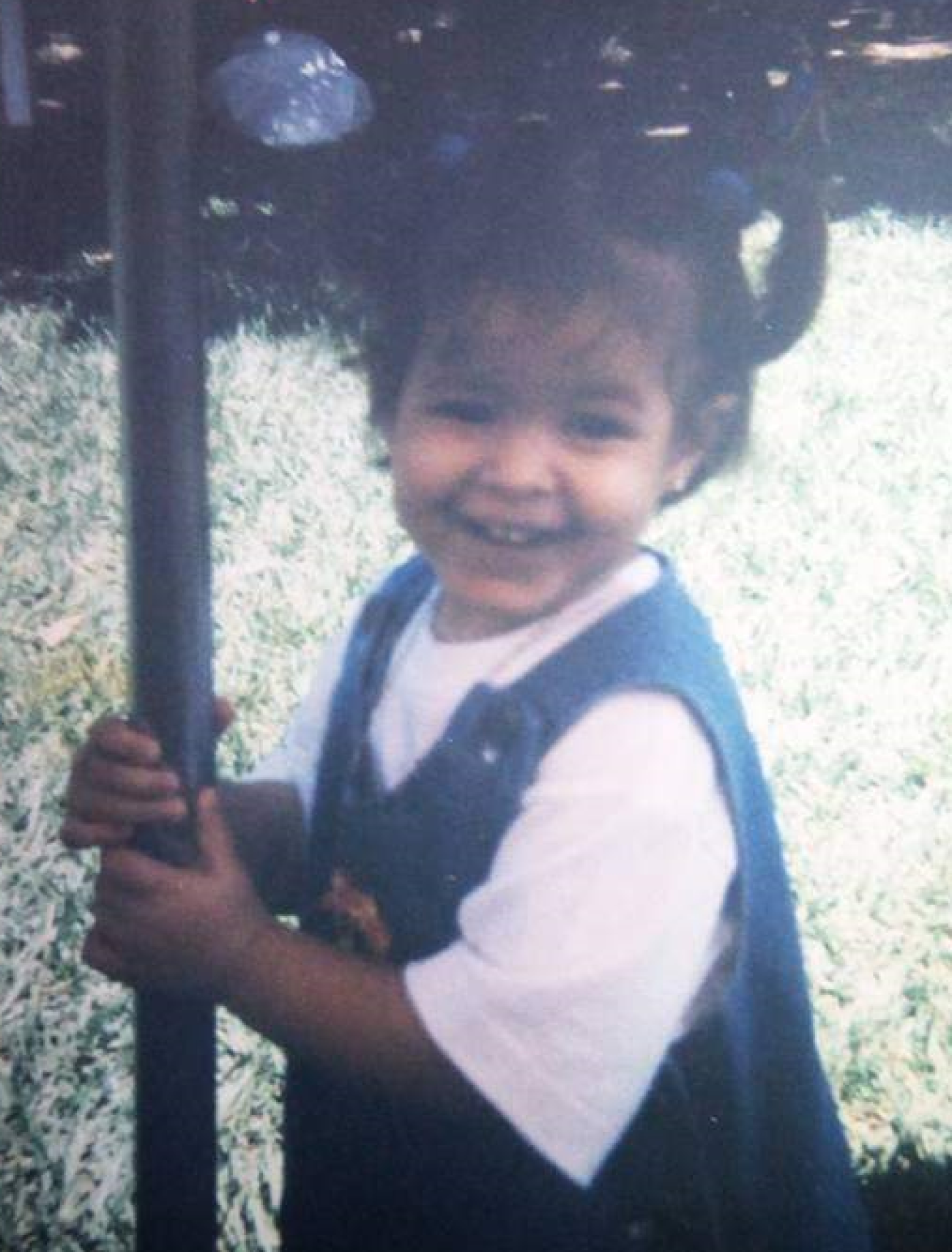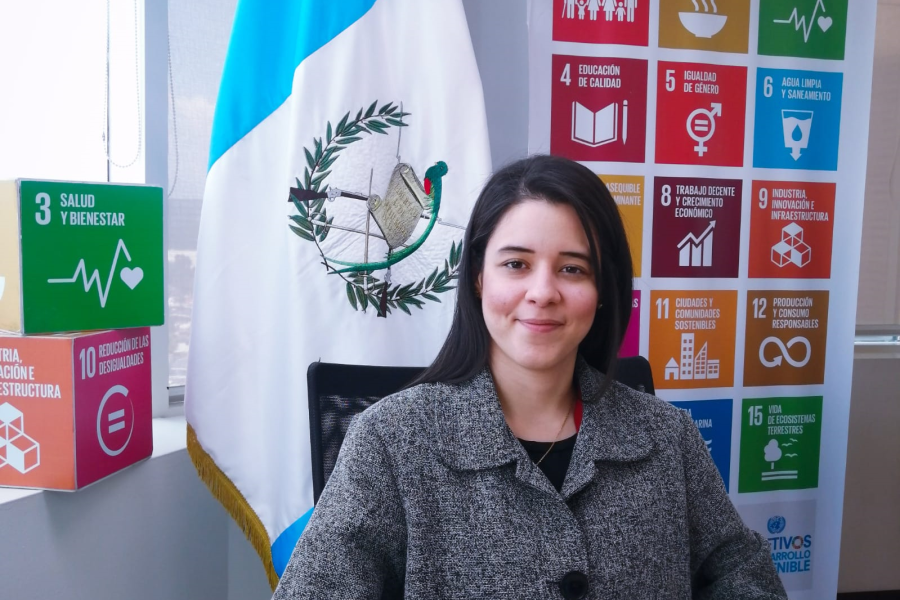Me sentí valorada e incluida

Una practicante en ONU Guatemala que se prepara como técnica de desarrollo rural de la Universidad Autónoma de Honduras (UNAH).
“Si pudiera hablar con la Fiorella de 11 años, le diría que no creería lo que va a hacer en 15 años, que es extraordinario lo que llegaría a lograr”, son las palabras de Fiorella María Arita Vega, pasante universitaria de la Oficina del Coordinador Residente (OCR), en el Sistema de Naciones Unidas en Guatemala.
Fiorella es una joven de Honduras viviendo en Guatemala. A sus 26 años estudia la carrera de Desarrollo Social en la Universidad Nacional Autónoma de Honduras. Apoya acciones sobre la Agenda 2030 en la Oficina de la Coordinación Residente a cargo del mismo Representante del Secretario General de las Naciones Unidas en Guatemala. Su práctica universitaria ha resultado ser la oportunidad de ampliar su horizonte, conocer a personas distintas y también le ha exigido adaptarse a una dinámica de trabajo en un organismo internacional con altos estándares de profesionalismo.
Desde muy joven ella se sintió atraída en temas vinculados al desarrollo social y los derechos humanos. Participó en diferentes iniciativas en lo académico, e incluso en lo político en su comunidad de Santa Rosa de Copán, Honduras, una provincia fronteriza con Guatemala.
“Siempre pensé que el desarrollo debe ser equitativo. Veía las desigualdades entre lo rural y lo urbano, los hombres y las mujeres, las personas de un pensamiento y otras que pensaban diferente, simplemente no entendía por qué tendrían que ser tratadas de manera diferente” dice la joven mientras suspira recordando experiencias que vivió en su niñez y adolescencia. “Es difícil romper con las desigualdades” agrega. Por eso ella ha mostrado un interés particular en el Objetivo de Desarrollo Sostenible (ODS) número 10.
El ODS 10 habla sobre la eliminación de las desigualdades. A ella le llama la atención dos metas que pretenden “de aquí a 2030, lograr progresivamente y mantener el crecimiento de los ingresos del 40% más pobre de la población a una tasa superior a la media nacional,” y “de aquí al 2030, potenciar y promover la inclusión social, económica y política de todas las personas, independientemente de su edad, sexo, discapacidad, raza, etnia, origen, religión o situación económica u otra condición.”
Sobre esas pretensiones ella se pregunta “¿Cómo se podría alcanzar esas aspiraciones y cómo puedo yo contribuir a ellas?”, algunas de las respuestas ya las ha encontrado en su experiencia en ONU Guatemala. “No me imaginé que muchas de esas dudas que traía desde niña, las estoy comenzando a resolver en este espacio que se me ha abierto a través de la UNAH, hasta mis docentes se han asombrado de lo que estamos logrando” dice sonriendo.
Ella buscaba incidir más en los problemas sociales que veía y en los que trabajaba. En el 2017 llegó una pausa y se dedicó a estudiar. Ese periodo la ha llevado a meditar sobre las rutas para involucrarse más en acciones que cambien actitudes y contribuyan a un mundo mejor. Leer “el camino hacia la dignidad” al que refiere el Secretario General de las Naciones Unidas en su lanzamiento de la Agenda 2030 le hizo ver a otras direcciones.
El momento clave fue cuando se enfrenta al requisito de hacer sus prácticas para obtener el grado de técnica en desarrollo rural. Con intenciones de trasladarse a Guatemala buscó en diferentes instancias como involucrarse con una organización que le aceptara y que coincidiera con sus aspiraciones. “Pensé que no tenía nada que perder con probar. Así que estuve solicitando en varios lados. No podía creer cuando logré una cita a una entrevista en las Naciones Unidas en Guatemala”. Fueron semanas de ansiedad, nervios y temores. Pero llegó el día que recibí la noticia que había sido admitida” expresa Fiorella con una gran sonrisa y un suspiro como si estuviera volviendo a suceder.
“Una mañana mi supervisor me invitó a escribir una columna de opinión. Sin pensar acepté. Fue emocionante ver mi artículo publicado en el Diario de Centro América. Lo compartí con mis docentes y al momento mis compañeras y compañeros veían lo que estaba logrando con esta pasantía” recuerda Fiorella emocionada con el ejercicio que continuó con otra columna recién publicada. “Una pasante guatemalteca me animó a que también presentar un programa de televisión denominado Hoy con la ONU. Ella es estudiante de comunicación y yo no, pensé, pero nuevamente me animé y el programa también gustó. Toda la temática es por la que yo he trabajado durante los últimos años. Esta es mi oportunidad para trabajar en el desarrollo sostenible” dijo convencida mientras aplica a un curso que la OCR abrirá para explicar cómo colaborar con la ONU tanto a nivel de voluntariado, consultoría, contrato de servicios o como personal de la ONU. Su próximo paso será aplicar a alguna vacante. “Aquí me siento valorada e incluida. Espero tener la oportunidad de dedicarme a esto” afirma.

Uno de los aspectos que Fiorella destaca de su pasantía es que ha trabajado en una oficina donde se ha sentido plenamente incorporada y ha visto como se incluye a otras, principalmente a personas con discapacidad, aspecto que fue significativo y que espera seguir compartiendo en lugares así en el futuro.
Según la Comisión Económica para América (CEPAL) en nuestra región hay alrededor de 160 millones de personas jóvenes, dato que demuestra la importancia de que las y los jóvenes se involucren en el desarrollo sostenible, así como lo hace Fiorella Arita, pasante universitaria de la OCR en Guatemala.
Escrito por Antonio Palma, Voluntario de las Naciones Unidas en Guatemala
Traducción a Inglés por Emilia Alvarado Alvarez Depresle, practicante universitaria en Université Savoie Mont Blanc, Francia.
----
I felt valued and included
“If I could talk to my 11-year-old, I would tell her that she would not believe what she is going to do in the next 15 years, and how extraordinary it will be,” these are the words of Fiorella María Arita Vega, an intern at the Office of the Resident Coordinator (ORC), United Nations Guatemala.
Fiorella is a young woman from Honduras living in Guatemala. At 26, she is studying Social Development at the Universidad Nacional Autónoma de Honduras. She supports the actions on the 2030 Agenda in the Resident Coordination Office in charge of the same Representative of the Secretary-General of the United Nations in Guatemala. Her internship has turned out to be an opportunity to broaden her horizon, meet different people and has also required her to adapt her work dynamic, to an international organization with high standards of professionalism.
From a very young age, she was attracted to issues related to social development and human rights. She participated in different academic and even political initiatives in her community Santa Rosa de Copán, Honduras, a province bordering Guatemala.
“I always thought that development should be equitable. I saw the inequalities between the rural and the urban, men and women, people of one mind and others who thought differently, I simply did not understand why they should be treated differently” says the young woman while sighing remembering experiences she lived in her childhood and adolescence. "It is difficult to tear apart inequalities," she adds. That is why she has shown a particular interest in the Sustainable Development Goal (SDG) number 10.
SDG 10 talks about eliminating inequalities. She is struck by two goals that aim to: "by 2030, progressively achieve and maintain income growth for the poorest 40% of the population at a rate above the national average," and "by 2030, empower and promote the social, economic and political inclusion of all people, regardless of age, sex, disability, race, ethnicity, origin, religion, economic or other status.”
She wonders about these aspirations “How could these aspirations be achieved and how can I contribute to them?” She has already found some of the answers in her internship at UN Guatemala. "I still can’t believe that many of those doubts that I had as a child, are all being answered and through the UNAH, even my teachers have been amazed at what we are achieving," she says smiling.
She sought to influence more in the social problems that she saw and in which she worked. In 2017 she took a break and she dedicated herself to studying. That period has led her to meditate on the different ways she can get more involved in actions that change attitudes and contribute to a better world. Reading "The Path to Dignity" referred to by the Secretary General of the United Nations in his launch of the 2030 Agenda made her see other perspectives.
The key moment was when she faced the requirement to do her internship to obtain a technical degree in Rural Development. With the intention of moving to Guatemala, she sought in different instances how to get involved with an organization that would accept her and that would coincide with her aspirations. “I thought I had nothing to lose by trying. So I was applying in various places. I couldn't believe it when I made an appointment for an interview at the United Nations in Guatemala. They were weeks of anxiety, nerves and fears. But the day came when I received the news that I had been admitted” says Fiorella with a big smile and a sigh as if it were happening again.
“One morning my supervisor invited me to write an article. Without thinking I accepted. It was exciting to see my article published in the Diario de Centro América. I shared it with my teachers and at the moment my classmates saw what I was achieving with this internship” recalls Fiorella, after the first article she continued to write other published articles. “A Guatemalan intern encouraged me to also present a television program called Hoy en la ONU. She is a communication student, and I am not, I thought, but again I was encouraged, and the program was well-received. The whole program was about my work in the past recent years.
“This is my opportunity to work on sustainable development,” she said convinced while applying to a course that the ORC will open to explain how to collaborate with the UN both as a volunteer, consultant, service contract or as UN staff. Her next step will be to apply for a vacancy at the United Nations. “Here I feel valued and included. I hope to have the opportunity to dedicate myself to this”, she affirms.
One of the aspects that Fiorella highlights from her internship is that she has worked in an office where she has felt fully incorporated and has seen how others are included, mainly people with disabilities, an aspect that was significant and that she hopes to continue sharing in places like this in the future.
According to the Economic Commission for the Americas (ECLAC), there are around 160 million young people in our region, a fact that demonstrates the importance of young people getting involved in sustainable development, as does Fiorella Arita, a university intern at the OCR in Guatemala.



